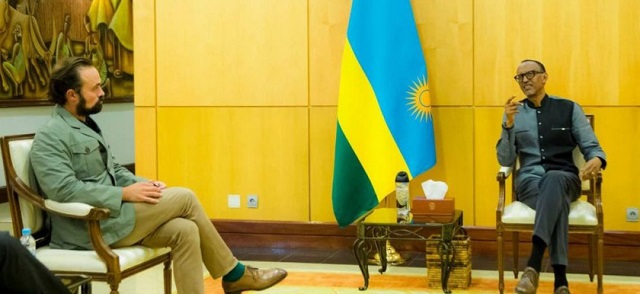
Unlike traditional authoritarianism that openly sought monopolistic control, modern authoritarianism masks it
FEATURE | ALEXANDER DUKALSKIS | Earlier this year, the staff of Rwanda’s minister of justice accidentally sent Al Jazeera journalists a video recording that included the minister’s preparation sessions with a public relations firm for an upcoming interview. The interview was about the Rwandan government’s involvement in a scheme to lure exile Paul Rusesabagina to Rwanda so that he could be arrested and tried.
In a special edition of UpFront, Al Jazeera asked Rwanda’s Justice minister, Johnston Busingye ,about the circumstances surrounding government critic Rusesabagina’s sudden appearance in Kigali, after years of living in exile.
Human rights organisations, members of the United States Congress and the European Parliament described Rusesabagina’s rendition to Rwanda as illegal under international law.
Rusesabagina helped save hundreds of Rwandans during the genocide by sheltering them in a five-star Hotel des Mille Collines, a story that was made into the movie Hotel Rwanda. He later became a vocal and sometimes controversial critic from abroad of Paul Kagame’s government. He now faces trial on terrorism charges.
According to the indictment issued by the Rwandan authorities, Rusesabagina is accused of nine offences, among them murder, armed robbery and being a member of a terrorist organisation.
The charges centre on Rusesabagina’s leadership in the Rwanda Movement for Democratic Change, an opposition coalition in exile whose armed wing, the National Liberation Front, has been accused by Rwandan authorities of carrying out attacks along Rwanda’s southern border with Burundi in 2018.
The video that was accidentally send to Al Jazeera shows consultants from Chelgate, a UK “reputation and relationship management” firm, prepping the minister to evade questions about Rwanda’s involvement in Rusesabagina’s capture.
Chelgate was founded by Terence Fane-Saunders, one of the world’s leading international public relations professionals, renowned for being was responsible for the establishment of the first public relations consultancy in the People’s Republic of China.
Chelgate’s episode with Rwanda nicely illustrates the multiple ways that authoritarian states – countries where the leadership maintains power by non-democratic means – manage their image abroad. There’s plenty of scholarly debate about what “counts” as authoritarianism and about different subtypes of authoritarian states. But controlling domestic institutions to preclude genuine political competition and pluralism is a hallmark of the modern authoritarian strategy.
According to a 2017 Special Report `Breaking Down Democracy’ by Freedom House, unlike traditional authoritarianism that sought monopolistic control over political life through a one-party system organised around a strongman or military junta, modern authoritarianism’s major defining feature is an illusion of pluralism that masks state control over key political institutions, with co-opted or otherwise defanged opposition parties allowed to participate in regular elections. It routinely hires political consultants and lobbyists from democratic countries to represent its interests.
According to Feeedom House, this tendency by autocracies is a growing phenomenon with China in the vanguard, but there are also K Street representatives for Russia, Kazakhstan, Azerbaijan, Turkey, Ethiopia, and practically all of the authoritarian states in the Middle East.
As I argue in my new book Making the World Safe for Dictatorship, a good image abroad affords many advantages to authoritarian leaders. It makes achieving foreign policy goals easier and helps marginalise foreign critics. It also makes it tougher for exiles and domestic activists to work together and solidifies the government’s legitimacy domestically.
The book draws on a range of data. I examined filings by public relations firms, gathered data on cases of transnational repression, did fieldwork and interviews, watched authoritarian propaganda, and more.
Although the book is global in scope, I also take a closer look at China, Rwanda and North Korea in case study chapters. These cases were chosen to illustrate how things play out given different regime types, capabilities, regional contexts and ambitions. Understanding authoritarian image management is important. It helps explain our global information environment and the behaviour of authoritarian states in it.
Managing their image
To manage their image abroad, authoritarian states try to advance a favourable narrative about themselves. They do things like hire public relations firms to produce positive content, disseminate propaganda themselves and cultivate friendly foreigners who can speak on their behalf.
But they also try to silence, obscure, or discredit criticisms of their rule.
They try to “spin” negative news stories, sow discord or paranoia in activist communities abroad, and repress or even kill their exiled critics.
Back to Rwanda. During his decades in power, Kagame has systematically undermined opposition, manipulated elections and repressed critics at home and abroad. He also amended the constitution so he can rule until 2034. In 2020, the Sweden-based Varieties of Democracy Institute ranked Rwanda 150th out of 179 countries in the world on its index of liberal democracy. In other words, clearly authoritarian.
Kagame’s ruling political party – the Rwandan Patriotic Front – pays a lot of attention to its image abroad. Rwanda is an avid consumer of public relations services from firms based in Europe and the U.S. For example, the same year that Kagame won over 95% of the vote in the heavily manipulated 2003 election, Rwanda’s embassy in the U.S. contracted American PR firms to boost the image of the country and its leader.
As Kagame consolidated power domestically, it was apparently important to be seen positively in the U.S; a major aid donor.
The post How authoritarian rulers manage international image appeared first on The Independent Uganda:.
from The Independent Uganda: https://ift.tt/3BTKnkd
0 Comments